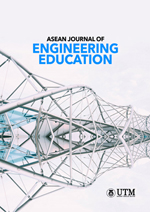Reshaping Engineering Education: Addressing Complex Human Challenges: A Book Review
DOI:
https://doi.org/10.11113/ajee2024.8n2.169Keywords:
Systems thinking, interdisciplinary learning, problem-based learning, project-based learning, curriculum transformationAbstract
Reshaping Engineering Education: Addressing Complex Human Challenges, authored by Fawwaz Habbal, Anette Kolmos, Roger G. Hadgraft, Jette Egelund Holgaard, and Kamar Reda, addresses the urgent need for transformative changes in engineering education. The authors argue that the traditional curriculum, primarily focused on mathematical rigour and applied sciences, is insufficient to equip graduates for the complex, interdisciplinary challenges of the modern world. These challenges, such as global sustainability, climate change, and the digital revolution, require holistic, systems-thinking approaches. The book is structured into four main sections. Part I highlights the importance of systems thinking and design methodologies in engineering education, positioning engineers as problem-solvers in complex real-world systems. Part II explores pedagogical changes, advocating for problem-based and project-based learning as key methods to foster critical thinking and creativity. Part III presents case studies from Harvard University, Aalborg University, and the University of Technology Sydney, demonstrating successful applications of these educational reforms. Part IV concludes with actionable recommendations for institutions to integrate interdisciplinary and design-focused curricula. Through its examination of innovative teaching strategies and case studies, the book emphasizes the need for collaboration, adaptability, and interdisciplinary learning in modern engineering education. It offers a comprehensive framework for reshaping engineering programs and preparing future engineers with the skills necessary to tackle complex human challenges.



















